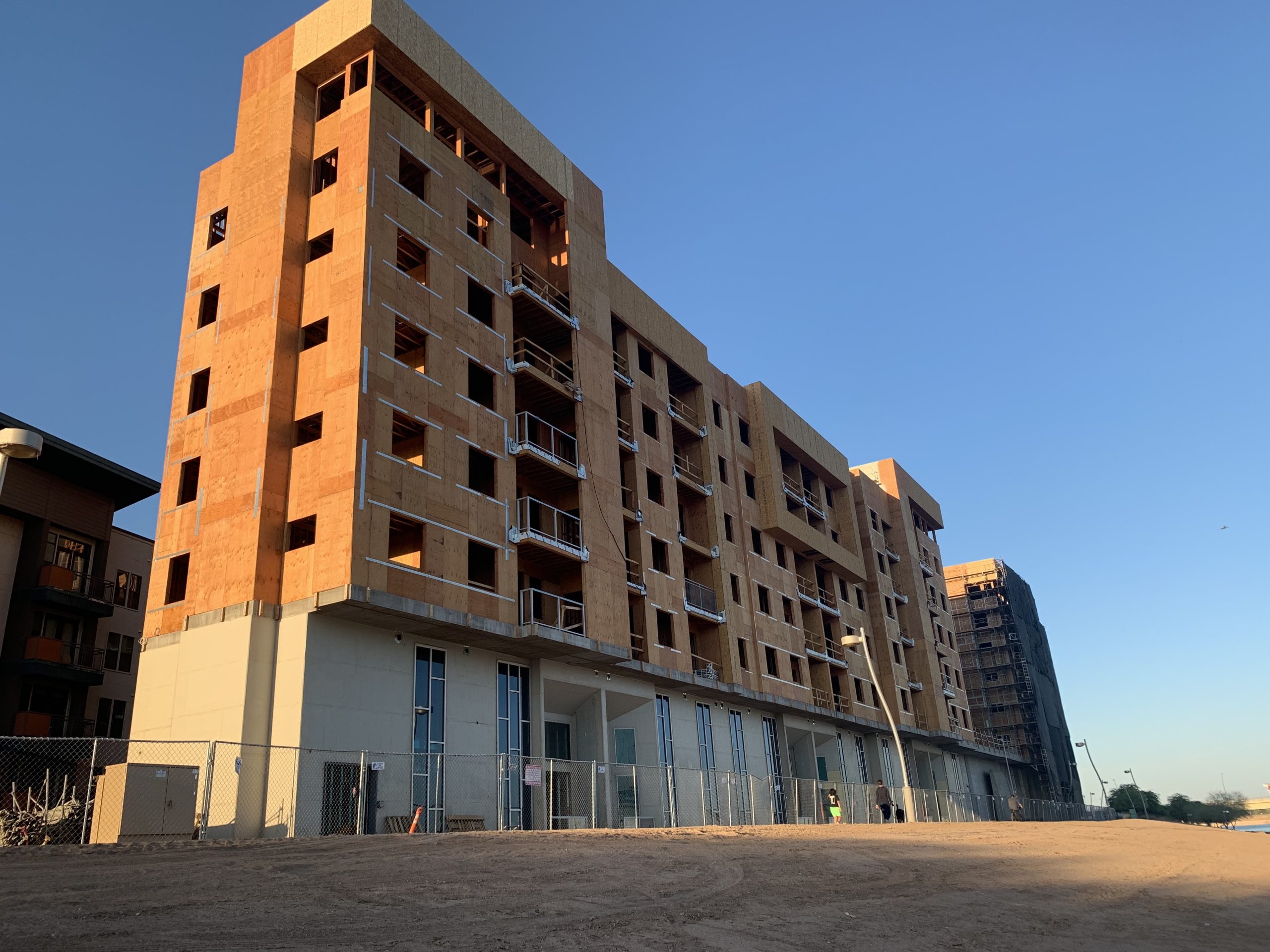Forgive us if you’ve heard this before: The Arizona Legislature has yet again failed to act on housing affordability.
Despite a tremendous effort from legislators who have led on this issue—Sen. Steve Kaiser, Sen. Anna Hernandez, Rep. Analise Ortiz, and Rep. Oscar De Los Santos—alongside the support of numerous advocacy groups, legislation addressing the housing affordability came up short.
Arizona has a shortage of 270,000 homes. This inaction guarantees that housing will only get increasingly unaffordable as Arizona continues to add jobs and see economic growth. We will continue fighting to legalize housing in Tempe and statewide, but we should examine how the legislature tried—and failed—to deal with the housing shortage this session.
How housing reform died this session
From the beginning, the strongest opposition to zoning reform came from the Arizona League of Cities and Towns.
They opposed the original omnibus housing reform bill, SB 1117 which would have legalized more types of housing, allowed more housing near transit, and streamlined approval of housing. All of these reforms would have allowed an increased supply of housing, allowed previously banned naturally affordable housing types to be built, and lowered the costs.
It was vehemently opposed by the League, which lobbied legislators hard against it. The League also used official city channels, from social media to email blasts to stir up fears about the bill.

SB 1117 passed out of the Senate commerce committee and made it to the floor. The bill was unceremoniously killed with all but one Democrat and a number of Republicans voting against it.
It was an embarrassing display, with comments made on the floor that reflected a lack of understanding of housing policy. Some senators said they supported dense, infill housing but opposed the bill for reasons that were nonspecific and untethered from the actual text of the legislation.
A glimmer of hope
After the defeat of SB 1117, three separate housing bills emerged that had similar provisions.
- HB 2536: Which would have legalized casitas, single-room occupancies, eliminated parking mandates, and required housing needs reports from Arizona’s largest cities.
- SB 1163: Which would have allowed smaller lot sizes, required localities to zone for duplexes and triplexes, and would provide for a regular housing needs assessment from cities.
Finally, there was SB 1161. A common attack from the League was that the original housing bill (SB 1117) did not require affordability. However, this bill did exactly that, allowing subsidized affordable Low Income Housing Tax Credit projects to be built by-right near light rail stations.
Despite the affordability requirements, this was still opposed by the League, suggesting that their stated concerns about affordability were simply a cynical line of attack aimed at protecting the power of local politicians.
Compromised
Eventually, a deal was struck with the League to pass an expanded ADU bill. The deal would legalize casitas, single-room occupancies for those 55 and older, and require housing needs assessments from cities. It would also allow for additional density and height near transit.
This compromise amended SB 1163 and SB 1161 to provide less housing supply and do less to make housing affordable. Still, it meant allowing for more housing than allowed under the status quo, so Tempe YIMBY and many others backed the compromise in the hopes it would mean progress, however inadequate.
In the short time after the deal was announced, things fell apart.
House Republicans require a majority of their caucus to support legislation for it to be brought to the floor. The League’s deal seemed to bring enough Democrats on board but Republicans lost needed votes, with Freedom Caucus opposition preventing the deal from coming to the floor. The House was ultimately unable to bring the bills up for a vote.
In Rep. Ortiz’s telling, the League had promised to work to deliver Republican votes for the deal. It’s not clear the effort was made once the deal was losing votes. The League may have been happy to allow it to wither on the vine.
A last-ditch attempt was made in the Senate, with a watered-down HB 2536. The bill was still opposed by the League, yet similar in many ways to the compromise deal, with notable differences being a prohibition on design review and parking mandates.

When HB 2536 came to the floor, it received more Democratic votes than SB 1117 had. Sadly this was not enough to pass, as it lost Republican votes.
Takeaways
Democratic legislators are very sympathetic to arguments about local control, and not without cause given the history of Republican legislatures preempting blue cities on policy. This knee-jerk reflex will be an issue they have to overcome if they wish to see housing affordability dealt with. Job and housing markets are interconnected and overlap city borders. Restricting housing supply in one city impacts the surrounding area and compounds the statewide housing shortage.
This sympathy makes the League of Cities a major obstacle to dealing with the housing crisis. Legislative Democrats are particularly sympathetic to arguments made by the League, even when they are often contradictory.
Simultaneously the League would claim cities are building enough housing supply, while previously having said cities need to consider zoning to address shortages. They argued additional supply will not impact affordability, while supporting half-measures that would provide some increase in supply. They are not making principled or evidence-based objections, they are throwing excuses for inaction at the wall and seeing what will stick.
It is true that cities have their hands tied on necessary measures like tenant protections, there is nothing stopping them from implementing the reforms being considered at the state level. That they are not even touching the lowest-hanging fruit shows the necessity for statewide action.
It is also important to maintain a bipartisan coalition on this issue. Housing policy is an issue that uniquely cuts across ideological and party lines in a hyperpolarized era. In a state as divided as Arizona, there is a risk that attempting to gain more support on one side can negatively polarize the other side, even on common sense policy like zoning reform.
It’s a matter of when, not if
Reforms that end bans on apartments, casitas, duplexes, and other housing types have to be enacted eventually. The crisis will continue growing until legislators address constraints on the construction of new housing stock in high-demand areas.
At this point, further delay is ignorance bordering on malice. Legislators had plenty of time to get ahead of the problems our neighbors in California have dealt with for decades. Arizona had a chance to get ahead of the curve and now two successive administrations under both parties have failed to do so. This is a failure of leadership.
JOIN OUR NEWSLETTER
We’ll keep you up to date on the latest on Tempe housing & transit news, upcoming events, and more!
Our housing crisis will get worse and compound other issues facing the state. The release valve for Arizona’s housing market has been new sprawling subdivisions that use scarce groundwater. The Arizona Department of Water will no longer approve new housing subdivisions in the Valley that rely on groundwater.
Per Axios, around 75% of new housing is being built in the West Valley and Pinal County, two areas heavily reliant on groundwater. We have been advocating for dense, infill housing near existing job centers that use less water and have assured water supplies.
Lawmakers need to wise up to the arguments being made by housing opponents. When people argue against by-right zoning for affordable housing, they should consider that luxury McMansions can be built by-right while affordable housing can not. When the mayor of Paradise Valley (a town with one acre minimum lot sizes) says opposing these bills is about protecting homeowners and politicians, we should believe her.
Legislators need to understand that these reforms are extremely popular with Arizonans. Outside of local politicians and well organized groups of wealthy NIMBY homeowners, legalizing more housing options has solid majority support.
So please, ask your legislators what they did for housing this year. Ask your city council what they are doing to expand their city’s housing stock. Demand that lawmakers quit passing the buck and take action.
You can contact your legislators here.
Want to write for us? We are always looking for writing about urbanism, housing policy, and related issues impacting Tempe and our state. Email us at TempeYIMBY(at)gmail.com


Leave a Reply